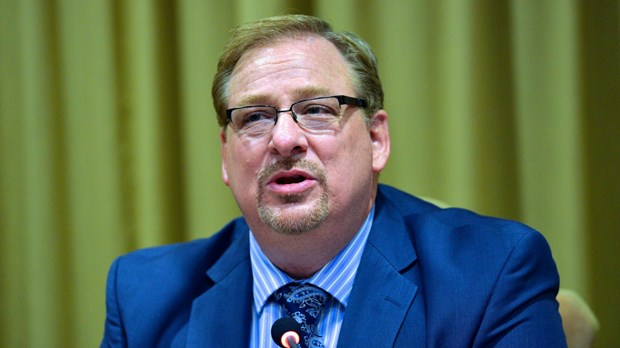Even Southern Baptists know not to turn down an invitation from the Pope.
Rick Warren, senior pastor of Saddleback Church, and Russell Moore,
president of the Ethics and Religious Liberties Commission, will meet
Pope Francis and offer an “evangelical Protestant” perspective as part
of a Vatican colloquium on marriage and family held this November 17-19.
“I am willing to go anywhere, when asked, to bear witness to what we as
evangelical Protestants believe about marriage and the gospel,
especially in times in which marriage is culturally imperiled,” wrore
Moore on why he's going to the Vatican despite his disagreements with the Pope.
“I can hardly criticize from across the Tiber and then refuse to talk,
when invited, about these matters,” he continued. “That’s especially the
case when the American bishops have been resolute in standing with us,
despite our real differences, on questions of religious liberty and the
future of the family.”
Prolific Bible scholar N. T. Wright, the subject of CT's April cover story, has also been invited. Wright and Moore will speak on the same panel on the gathering's second day. Warren will give a 30-minute presentation later that afternoon.
Two other Anglican leaders—the United Kingdom's Michael Nazir-Ali and Nigeria's Nicholas Okoh—are also among the 32 speakers,
as are Boston Pentecostal leader Jacqueline C. Rivers and Anabaptist
leader Johann Christoph Arnold. Mormon, Jewish, Muslim, and Sikh leaders
have also been invited.
The colloquium's stated goal:
The Complementarity of Man and Woman: An International Colloquium is a gathering of leaders and scholars from many religions across the globe, to examine and propose anew the beauty of the relationship between the man and the woman, in order to support and reinvigorate marriage and family life for the flourishing of human society.
Witnesses will draw from the wisdom of their religious tradition and cultural experience as they attest to the power and vitality of the complementary union of man and woman. It is hoped that the colloquium be a catalyst for creative language and projects, as well as for global solidarity, in the work of strengthening the nuptial relationship, both for the good of the spouses themselves and for the good of all who depend upon them.
In September, in anticipation of last month’s synod on the family,
Warren and nearly 50 other Christian conservative intellectuals and
church leaders signed an open letter urging the Pope to fight for marriage in the face of challenges like pornography, divorce, and cohabitation.
Following Francis’s ascent to the papacy, Moore told CT that he admired
the Catholic leader’s track record of living among the poor and caring
for social outcasts. "I pray that his example spurs evangelicals like me
to remember our mandate to love the least of these, the hurting and the
vulnerable, the brothers and sisters of our Lord," he said.
Moore's comment was part of CT's report on why Francis excites (most) evangelical leaders. Evangelist Luis Palau described Francis
to CT as a personal friend and a “very Bible-centered” and “very Jesus
Christ-centered man.” Argentine evangelicals saw Francis's selection as
an "answer to our prayers."
But not all have warmed to Francis's overtures to evangelicals. In July, a "near totality" of Italian evangelicals warned U.S. evangelicals
against getting too cozy with the Catholic Church. "What appear to be
similarities with the Evangelical faith and spirituality of sectors of
Roman Catholicism are not in themselves reasons for hope in a true
change," wrote leaders for the Italian Evangelical Alliance (IEA), the
Federation of Pentecostal Churches, and the Assemblies of God in Italy. A
few weeks later, Francis made an unprecedented visit to a Pentecostal
church where he apologized for Catholics' past persecution of other
Christians.
CT's previous coverage of Pope Francis includes five things evangelicals will cheer in the Pope's plan to change the Catholic Church.



No comments:
Post a Comment